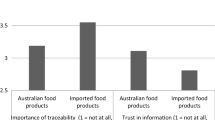In the first chapter ethical traceability was defined as ‘the ability to trace and map ethical aspects of the food chain by means of recorded identifications’. The first chapter also emphasized that access to information is a key issue for consumers who are concerned about food production processes. If such consumers are to make informed food choices on the basis of their ethical considerations, it will be necessary to make information on production histories available. This is exactly what can be done by implementing traceability. Ethical traceability therefore needs to entail a communicative endeavour which, in contrast to the legislation currently in force (see Chapter 2), includes the consumer. The current chapter addresses how ethical traceability should include strategies for ensuring appropriate information and communication with consumers.
Consumer concerns play a central role in this book’s discussions about ethical traceability. Chapter 2 has already indicated that one of the means of addressing these concerns is to be found in better communication about them. It is therefore important to acknowledge that regulatory, corporate and scientific bodies in the agri-food sector have recognized that they should be more accountable and responsive to the public at large, and should involve them in decision-making processes concerning technological applications to food whenever possible (Rowe and Frewer, 2000).
Since broader discussions about public involvement have a direct impact on the issue of communicating ethical traceability, this chapter will start with a short overview of recent discussions about the role of consumer concerns in regulatory and corporate decision-making processes. It begins by discussing the claim that (better) communication with consumers is quintessential for a socially responsible and responsive food production system. Next, three approaches to communication are discussed: firstly one-way information, secondly the use of participatory methods and finally co-production. The final section of the chapter outlines some of the implications for the purpose of communicating ethical traceability.
Access this chapter
Tax calculation will be finalised at checkout
Purchases are for personal use only
Preview
Unable to display preview. Download preview PDF.
Similar content being viewed by others
References
Beekman, V., E. de Bakker, H. Baranzke, O. Baune, M. Deblonde, E-M. Forsberg, R. de Graaff, H-W. Ingensiep, J. Lassen, B. Mepham, A. Porsborg Nielsen, S. Tomkins, E. Thorstensen, K. Millar, B. Skorupinski, F. Brom, M. Kaiser, P. Sandoe (2006) Ethical bio-Technology Assessment Tools for Agriculture and Food Production. Final Report Ethical Bio-TA Tools (QLG6-CT-2002–02594). The Hague: LEI.
Callon, M., B. Latour (1992) ‘Don’t throw the baby out with the bath school! A reply to Collins and Yearley’, pp. 343–68 in (ed.) Science as Practice and Culture. Chicago: University of Chicago Press.
Dryzek, J. (2000) Deliberative Democracy. Oxford: Oxford University Press.
Folbert, J.P., V. Beekman, J.C. Dagevos (2003) Praten met het publiek; Ontwikkelingen op het terrein van publieksraadpleging in het levensmiddelenbeleid [Talking with the public; Developments in public consultation in food policy]. The Hague: LEI.
Food Traceability Report, April 2006, Volume 6, Number 4.
Grimble, R., C. Man-kwun (1995) ‘Stakeholder analysis for natural resource management in developing countries: Some practical guidelines for making management more participatory and effective’. Natural Resources Forum, 19/2: 113–124.
Grin,J., Felix, F.,Bos, B.,Spielstra S (2004) ‘Practices for reflexive design: Lessons from a Dutch programme on sustainable agriculture’. International Journal of Foresight and Innovations Studies. 1/1–2 126–149.
Grunwald, A., G. Banse, C. Coenen, L. Hennen (2005) Internet and democracy. Analysis of Network-Based Communication from Cultural Aspects. TAB Working Report No. 100. www.tab.fzk.de
Habermas, J. (1984) The Theory of Communicative Action: Reason and Rationalization of Society. Cambridge: Polity Press.
Hansen, J., L. Holm, L. Frewer, P. Robinson, P. Sandoe (2003) ‘Beyond the knowledge deficit: Recent research into lay and expert attitudes to food risks’. Appetite, 41: 111–121.
Hardt, M., A. Negri (2000) Empire. New York: Harvard University Press.
Jasanoff, S. (1996) ‘Beyond epistemology: Relativism and engagement in the politics of science’. Social Studies of Science, 26/2: 393–418.
Kaiser, M., K. Millar, E. Thorstensen, S. Tomkins (2007) ‘Developing the ethical matrix as a decision-support framework: GM fish as a case study’. Journal of Agricultural and Environmental Ethics, 20/1: 65–80.
Korthals, M., M. Miele (2004) ‘Trust as communication on ethical dilemmas: Possibilities and commitments of consumers of animal friendly products’. EurSafe 2004 Science, Ethics and Society, 98–100.
Luhmann, N. (1968) Trust. A Mechanism for the Reduction of Social Complexity. Chichester: Wiley.
Lukawetz, G. (1999) ‘Online-communities als Demokratisierungsagenten und Marketingparadigma’. Deutsche Gesellschaft für Online-Forschung. www.gor.de/gor99/programm.html
Nielsen, H.K. (2006) ‘Internettet og den demokratiske offentlighed’ [The Internet and democratic publicity]. Working Paper Centre for Digital Æstetik Forskning Aarhus University.
Payne, D.M., C.A. Raiborn (2001) ‘Sustainable development: The ethics support the economics’. Journal of Business Ethics, 32/2: 157–168.
Rowe, G., L.J. Frewer (2000) ‘Public participation methods: A framework for evaluation’. Science, Technology and Human Values, 25/1: 3–29.
USDA (2004) Traceability in the U.S. food supply: Economic theory and industry studies. United States Department of Agriculture, Agricultural Economic Report Number 830.
Wynne, B. (1996) ‘May the sheep safely graze? A reflexive view of the expert-lay knowledge divide’, S. Lash et al. (eds.) Risk, Environment and Modernity: Towards a New Ecology. London: Sage.
Author information
Authors and Affiliations
Editor information
Editors and Affiliations
Rights and permissions
Copyright information
© 2008 Springer Science + Business Media B.V
About this chapter
Cite this chapter
Beekman, V., Coff, C., Korthals, M., Schipper, L. (2008). Communicating Ethical Traceability. In: Coff, C., Barling, D., Korthals, M., Nielsen, T. (eds) Ethical Traceability and Communicating Food. The International Library of Environmental, Agricultural and Food Ethics, vol 15. Springer, Dordrecht. https://doi.org/10.1007/978-1-4020-8524-6_13
Download citation
DOI: https://doi.org/10.1007/978-1-4020-8524-6_13
Publisher Name: Springer, Dordrecht
Print ISBN: 978-1-4020-8523-9
Online ISBN: 978-1-4020-8524-6
eBook Packages: Humanities, Social Sciences and LawPhilosophy and Religion (R0)




